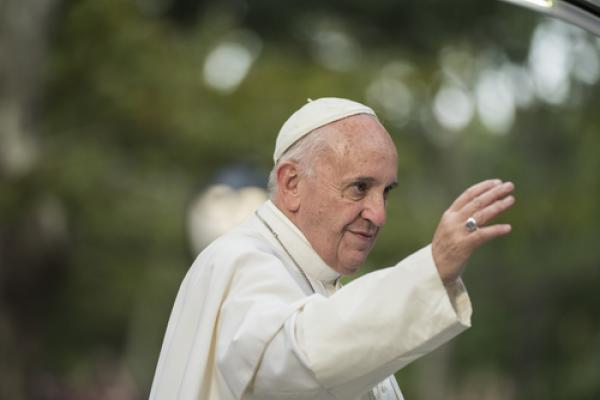You probably saw the media frenzy around Pope Francis’s comments aboard the papal plane on his trip back to Rome from Mexico last week. When asked about presidential candidate Donald Trump’s plan to build a wall along the U.S.- Mexico border, the pope said, “A person who thinks only about building walls, wherever they may be, and not building bridges, is not Christian.”
However, I was struck most by the pope’s following remarks, which were omitted from several mainstream media accounts — when he said of Trump’s plans, “This is not in the Gospel.”
This line reminds me of the pope’s namesake, Saint Francis of Assisi, and the famous saying often attributed to him: “Preach the Gospel at all times; when necessary, use words.” It could be said that Pope Francis did his best to shepherd the flock toward the call of the Gospel through his presence at the border, but just in case someone missed his message — he used words.
Both the pope’s actions and words at the border are good reminders of how we are called to respond to the suffering of migrants. We need a twofold approach: being present to those who are marginalized, and delivering a Gospel-filled message to those who can make change.
Being present can take on various forms. During his Mass on the border, Pope Francis invited us to measure the crisis of migration “names” and “stories” rather than “numbers” and “statistics.” Are we willing to come to know those who are immigrants in our own communities? Do we take the time to understand their lives and struggles?
We can find ways of being present to those who are not within our reach, too. We have to become people of solidarity.
Last fall, Sonia Nazario, the author of Enrique’s Journey, wrote a piece for The New York Times about a Honduran woman named July Elizabeth Pérez. July, a 32-year old mother, lost both her son and brother to Honduran gangs. Over the course of a decade, July made several attempts to flee Honduras for the U.S. to protect the lives of her remaining children — only to encounter rampant corruption, violence, and terror at nearly every turn while journeying north through Mexico.
“Why didn’t they leave him alive? Why? Why?” July sobbed, while recounting to Nazario the murder of her 14-year-old son, Anthony Yalibath Pacheco, who was tortured and murdered in 2014. His assailants left his body in a trash bag, bruised and burned to make a statement.
During his homily at the border Mass, Pope Francis spoke of a “voice crying out in the wilderness,” during Jesus’s time, but also today. July is one of these voices. Being present to July means listening to her voice — and with it, the call of Jesus on our lives.
Presence to others demands a new way of seeing them. On the border, Pope Francis spoke often about the need for conversion that transforms us into people of mercy. “We still have time to transform what is destroying us as a people, what is demeaning our humanity,” he said. “Let us together ask our God for the gift of conversion, the gift of tears.”
He described this mercy as a gift. Are we willing to receive the gift of tears? To act on it? They are tears that can sensitize our gaze and soften our attitudes in the face of another’s suffering. Tears can break us, making us capable of being converted to the other.
In addition to presence, our words have power, too — especially the ones we use in the public square. In the coming months our country will take steps toward deciding who should be its next leader. Many of us will also choose senators, representatives, governors, etc. In the meantime, those currently elected will continue to govern, including passing legislation and enforcing existing laws.
Are we ready to be a Gospel-filled voice, calling for policies that respond to the struggles of our brothers and sisters like July, who leave their home out of fear? Are we ready to amplify the pope’s message by calling for humane and comprehensive immigration reform, including U.S. policy in Central America and Mexico that respects the dignity of migrants?
We have the option of using our voice or not, but our suffering sisters and brothers have no such luxury. “The biggest threat to hope is when you feel that you do not matter to anybody or that you have been left aside. The biggest threat to hope is when you feel that, either being present or absent, you make no difference,” Francis said.
Pope Francis’s historic visit to the border was a reminder that it’s not too late for conversion, for salvation, for mercy. Let us respond to his prophetic message by becoming people of the Gospel, both in word and deed.
Got something to say about what you're reading? We value your feedback!
